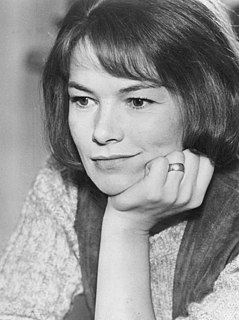A Quote by Kurt Vonnegut
One of the things that I tell beginning writers is this: If you describe a landscape, or a cityscape, or a seascape, always be sure to put a human figure somewhere in the scene. Why? Because readers are human beings, mostly interested in human beings. People are humanists. Most of them are humanists, that is.
Related Quotes
And people who believe in God think God has put human beings on earth because they think human beings are the best animal, but human beings are just an animal and they will evolve into another animal, and that animal will be cleverer and it will put human beings into a zoo, like we put chimpanzees and gorillas into a zoo. Or human beings will all catch a disease and die out or they will make too much pollution and kill themselves, and then there will only be insects in the world and they will be the best animal.
Much of human progress has been in defiance of religion or of the apparent natural order. The defiance of religious and secular authority has led to democracy, human rights, and the protection of the environment. Humanists make no apologies for this. Humanists twist no biblical doctrine to justify such actions.
In their overestimation of the role of civilization, the humanists misunderstand the primary forces of the world of primitive human drives with their untamable violence. With their optimistic view of the role of culture, they (the humanists) trivialize the terrifying, hardly solvable problems of mass hatred and of the great passionate psychoses of the human race.
A person is a person through other persons. None of us comes into the world fully formed. We would not know how to think, or walk, or speak, or behave as human beings unless we learned it from other human beings. We need other human beings in order to be human. I am because other people are. A person is entitled to a stable community life, and the first of these communities is the family.
We're human beings we are - all of us - and that's what people are liable to forget. Human beings don't like peace and goodwill and everybody loving everybody else. However much they may think they do, they don't really because they're not made like that. Human beings love eating and drinking and loving and hating. They also like showing off, grabbing all they can, fighting for their rights and bossing anybody who'll give them half a chance.
The sciences that purport to treat of human things -- the new scientific storyings of the social, the political, the racial or ethnic, and the psychic, nature of human beings -- treat not of human things but mere things, things that make up the physical, or circumstantial, content of human life but are not of the stuff of humanity, have not the human essence in them.
It's easy to sell good news like this, and the authors confidently rely on classic fallacious arguments. They argue by declaration, which is what makes the books so amusing. In matter-of-fact, authoritative tones, the authors tell us how plants and human beings exchange energy - or they describe what angels look like, whether or how they're sexed, how they communicate with human beings, and how they differ from ghosts. Readers might be expected to wonder, How do they know?
I am not attracted to writers by style. What style do Dickens, Grass, and Vonnegut have in common? How silly! I am attracted to what makes them angry, what makes them passionate, what outrages them, what they applaud and find sympathetic in human beings and what they detest about human beings, too. They are writers of great emotional range.






































